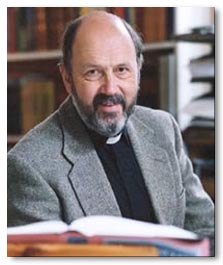Reform Party
- JOHN WILSON
N.T. Wright is arguably the most influential living Protestant theologian. He's also a scholar sending shock waves through Evangelical circles as he advances the view that the leaders of the Protestant Reformation Martin Luther especially misread St. Paul on the subject of justification by faith.
 |
Bishop
N.T. Wright |
Some argue that God lacks a sense of humor, but for those with eyes to see, there is plenty of evidence to the contrary. Consider: The most influential biblical scholar in American evangelical circles today is a bishop in the Church of England who regularly inveighs against U.S. "imperialism." For a comparable improbability, imagine a renaissance of the Democratic Party led by a devout Mormon from Texas.
This scholar contends that the leaders of the Protestant Reformation Martin Luther especially misread St. Paul on the subject of justification by faith. A self-described Reformed theologian, he proposes nothing less than a reformation of the Reformation, 500 years on and he does so by appealing to the Reformers' own motto, sola scriptura, "going back to scripture over against all human tradition."
His name is N.T. Wright. He has published three massive volumes of a projected six devoted to Christian Origins and the Question of God, the most recent of which argued forcefully for the historical reality of the Resurrection. In addition to his scholarly projects and his duties as Bishop of Durham, Dr. Wright produces a steady stream of popular books, tapes and other resources for the men and women in the pews.
It is this unusual combination of prodigious scholarly achievement and pastoral concern that makes Dr. Wright's influence so pervasive. But not everyone is thrilled. When a scholar claims that his tradition has gotten one of its fundamental teachings wrong, some alarm-ringing is to be expected. The American pastor and writer John Piper, for instance, is one of a number of prominent evangelicals to send out warnings about Dr. Wright. Another is J. Ligon Duncan III of the Alliance of Confessing Evangelicals, who has singled out Dr. Wright's influence as particularly dangerous precisely because, among proponents of the so-called new perspective on Paul, Dr. Wright "is the writer who has the clearest evangelical pedigree" and "the largest evangelical audience."
So what is at stake in this theological argument? "The doctrine of justification is the doctrine of the Reformation," says the distinguished Princeton Seminary theologian Bruce McCormack. Justification as it was taught to me and my fellow young Protestants a generation ago amounted to this: Catholics believed in salvation by works doing good in your earthly life would help win you a place in heaven but we Protestants, following Luther, knew that we were "saved by grace...through faith, and that not of yourselves; it is the gift of God, not of works, lest anyone should boast." Those words, from Paul's letter to the Ephesian church, expressed the very heart of the gospel, which Luther had recovered. And there was a parallel, we were taught, between the Catholic belief and the works-righteousness of the Pharisees, so uncompromisingly exposed by Jesus as mere outward show, divorced from inner virtue.
| We may be in the early stages of the most significant internal change in Christianity since the 16th century an exciting prospect. |
But for generations of Protestants, long before Dr. Wright, nagging questions remained. The Reformed emphasis on justification appeared to diminish the meaning of a life lived in obedience to Christ. Didn't James write in a letter Luther wanted to drop from the New Testament that faith without works is dead? And sure enough, one perennial problem of evangelical culture has been an overwhelming attention to "getting saved," while another has been a rigid legalism (don't dance, don't drink, don't play cards), smuggling works-righteousness in via the back door.
Dr. Wright's work is part of a larger corrective enterprise not a unified movement but rather a deep, massive shift on many fronts, including the rapid expansion of Christianity in Africa, Asia and Latin America. Old frames of reference lose their relevance; new alliances emerge. In the United States, high-level conversations between evangelicals and Catholics, initiated by evangelical leader Chuck Colson and the Rev. Richard John Neuhaus more than a decade ago and still going strong, have shown that there is no fundamental contradiction in their respective understandings of salvation a rapprochement that would have seemed inconceivable only a generation ago. In the meantime, evangelical scholars and pastors have profited from a new appreciation of the Jewishness of Jesus and the Jewish context of early Christianity.
We may be in the early stages of the most significant internal change in Christianity since the 16th century an exciting prospect. But Dr. Wright suggests that the key question for interpreters of Paul in the 21st century "may well turn out to be a matter not so much of comprehension," as an onlooker following the intricate debates over justification might suppose, "but of courage" the courage to live as a follower of Jesus.
Who was it, after all, who told us to take as our model the faith of a little child?
![]()
 This is Fraser Field, Founder of CERC. I hope you appreciated this piece. We curate these articles especially for believers like you.
This is Fraser Field, Founder of CERC. I hope you appreciated this piece. We curate these articles especially for believers like you.
Please show your appreciation by making a $3 donation. CERC is entirely reader supported.

Acknowledgement
John Wilson. "Reform Party." The Wall Street Journal (December 9, 2005).
Reprinted with permission from the author, John Wilson, and The Wall Street Journal © 2005 Dow Jones & Company. All rights reserved.
 |  |
The Author
John Wilson is the editor of Books & Culture, a bimonthly review, and of Best Christian Writing 2006.
Copyright © 2005 Wall Street Journal

